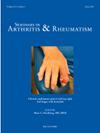炎症性关节炎患者疼痛与抑郁和焦虑的关系:一项系统综述
IF 4.4
2区 医学
Q1 RHEUMATOLOGY
引用次数: 0
摘要
目的:本系统综述综合了炎症性关节炎患者疼痛和抑郁/焦虑之间的相关文献,包括作用方向、关系介质和治疗影响。方法对截至2023年5月的协议数据库进行检索,确定了评估类风湿关节炎/脊椎关节炎患者疼痛与抑郁/焦虑之间的关联和/或抑郁/焦虑治疗对疼痛的影响的研究。混合人群研究、不可翻译的非英语研究、病例报告/系列/评论/社论以及数据不足的摘要/信函被排除在外。计票/荟萃分析综合了单时间点关联。叙述性综合总结了纵向关联/介质/治疗效果。JBI的关键评估工具和分级建议、评估、发展和评估方法评估了偏倚风险和证据强度。结果纳入79项研究。疼痛和抑郁之间存在双向关系。在单一时间点,抑郁症患者的疼痛更高(标准化平均差[SMD]=0.69 [95%CI 0.54,0.84],根据Cohen标准,代表中度影响);线性回归表明,疼痛(结果)和抑郁(解释变量)之间存在中度相关性(SMD=0.65[0.31,0.99]),而抑郁(结果)和疼痛(解释变量)之间存在轻度相关性(SMD=0.24[0.03,0.45])。纵向研究表明,抑郁越严重,疼痛越严重。焦虑的结果好坏参半。线性回归显示疼痛(结果)和焦虑(解释变量)之间的相关性很小(SMD=0.03[0.001,0.05]),焦虑(结果)和疼痛(解释变量)之间的相关性中等(SMD=0.55[0.20,0.91])。两项纵向研究考虑了中介因素(其中一项表明抑郁症的“被动应对”)。试验表明抗抑郁药可以减轻抑郁症患者的疼痛。35%的研究为高偏倚风险,34%为中等偏倚风险,30%为低偏倚风险;证据质量很低。结论炎症性关节炎患者疼痛和抑郁之间存在一定的双向关联(基于非常低质量的证据),支持生物心理社会疼痛管理。本文章由计算机程序翻译,如有差异,请以英文原文为准。

The relationship between pain and depression and anxiety in people with inflammatory arthritis: A systematic review
Objective
This PROSPERO-registered (CRD42023411823) systematic review synthesised literature on the associations between pain and depression/anxiety in inflammatory arthritis, including the direction of effect, relationship mediators, and treatment impacts.
Methods
Protocolised-database searches were conducted to May-2023 and studies assessing the associations between pain and depression/anxiety and/or impacts of depression/anxiety treatment on pain in people with rheumatoid arthritis/spondyloarthritis identified. Studies with mixed-populations, non-translatable non-English studies, case-reports/series/reviews/editorials, and abstracts/letters with insufficient-data were excluded. Vote-counting/meta-analysis synthesised single-time-point associations. Narrative synthesis summarised longitudinal associations/mediators/treatment effects. JBI critical-appraisal tools and the Grading of Recommendations, Assessment, Development and Evaluations approach evaluated risk-of-bias and strength-of-evidence.
Results
Seventy-nine studies were included. A bidirectional relationship between pain and depression was observed. At single-time-points, pain was higher in those with depression (standardised mean difference [SMD]=0.69 [95%CI 0.54,0.84]; representing a moderate effect as per Cohen’s criteria); linear regressions demonstrated moderate associations between pain (outcome) and depression (explanatory-variable) (SMD=0.65 [0.31,0.99]) and small associations between depression (outcome) and pain (explanatory-variable) (SMD=0.24 [0.03,0.45]). Longitudinal studies indicated greater pain with worse depression. Findings were mixed for anxiety. Linear regressions showed minimal associations between pain (outcome) and anxiety (explanatory-variable) (SMD=0.03 [0.001,0.05]) and moderate between anxiety (outcome) and pain (explanatory-variable) (SMD=0.55 [0.20,0.91]). Two longitudinal studies considered mediators (one suggesting “passive coping” in depression). Trials indicated anti-depressants reduced pain in people with comorbid-depression. Thirty-five percent of studies were at high, 34% moderate, and 30% low risk-of-bias; evidence was very low/low-quality.
Conclusion
A modest bidirectional association exists between pain and depression in inflammatory arthritis (based on very low-quality evidence), supporting biopsychosocial pain management.
求助全文
通过发布文献求助,成功后即可免费获取论文全文。
去求助
来源期刊
CiteScore
9.20
自引率
4.00%
发文量
176
审稿时长
46 days
期刊介绍:
Seminars in Arthritis and Rheumatism provides access to the highest-quality clinical, therapeutic and translational research about arthritis, rheumatology and musculoskeletal disorders that affect the joints and connective tissue. Each bimonthly issue includes articles giving you the latest diagnostic criteria, consensus statements, systematic reviews and meta-analyses as well as clinical and translational research studies. Read this journal for the latest groundbreaking research and to gain insights from scientists and clinicians on the management and treatment of musculoskeletal and autoimmune rheumatologic diseases. The journal is of interest to rheumatologists, orthopedic surgeons, internal medicine physicians, immunologists and specialists in bone and mineral metabolism.

 求助内容:
求助内容: 应助结果提醒方式:
应助结果提醒方式:


